Posts Tagged ‘Burma Partnership’ (399 found)
Burma Parliament Must Reject Dangerous Religious Conversion Law
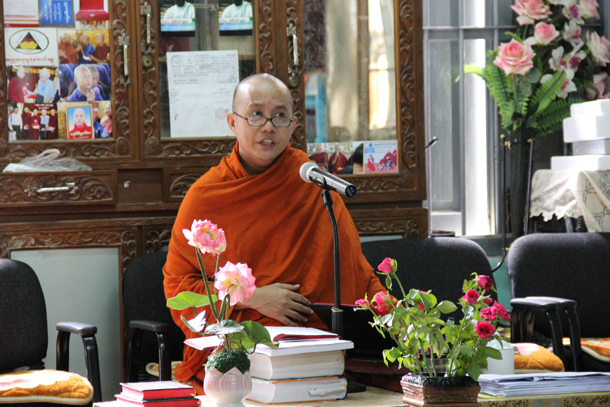 The introduction of the draft Law on Religious Conversions (the Law) – published in full in Burmese in state media on 27 May 2014, for the consideration of Parliament and the public – has justifiably triggered a torrent of criticism over the past few days, at national, regional and international levels. Human Rights Watch has urged the Burma Parliament to drop the Law, while the Asian Human Rights Commission has called for “the strongest opposition to the Law, both in the public domain and in the legislature.”
The introduction of the draft Law on Religious Conversions (the Law) – published in full in Burmese in state media on 27 May 2014, for the consideration of Parliament and the public – has justifiably triggered a torrent of criticism over the past few days, at national, regional and international levels. Human Rights Watch has urged the Burma Parliament to drop the Law, while the Asian Human Rights Commission has called for “the strongest opposition to the Law, both in the public domain and in the legislature.”
Part of a package of four bills which comprise measures to “protect race and religion,” the Law is the product of a very powerful lobby in contemporary Burma, namely a coalition of Buddhist monks known as the “Organization for the Protection of Race, Religion and Belief” (the OPRRB), which has been petitioning President Thein Sein and the Burma Government to address the simmering issue of race and religion since religious and communal tensions first broke out in Arakan State almost exactly two years ago. One of the leaders of the OPRRB, Tilawka Biwuntha, told Radio Free Asia that his organization were pleased with the introduction of the Law.
• • •Another Great year for Burma’s Drug Trade
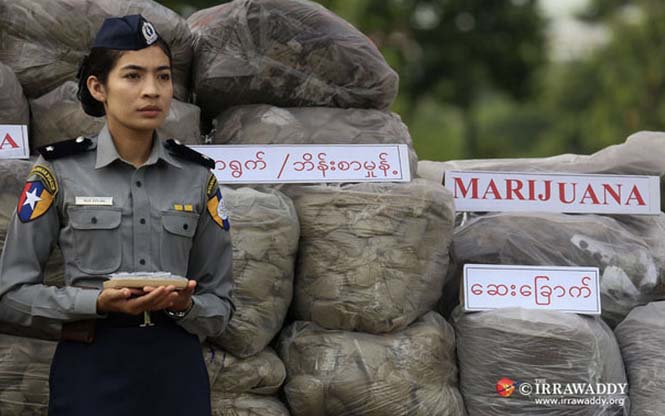 It is of no surprise that the latest report from the UN’s Office for Drugs and Crime (UNODC) on synthetic drugs finds that methamphetamine production in Burma continues to rise. Burma is already the second highest producer of opium in the world after Afghanistan and the fact that production rates of both opium and methamphetamine are increasing year on year points to a more complex picture than simply increase in demand. Poverty, displacement, conflict, and government complicity are all factors in this miserable state of affairs.
It is of no surprise that the latest report from the UN’s Office for Drugs and Crime (UNODC) on synthetic drugs finds that methamphetamine production in Burma continues to rise. Burma is already the second highest producer of opium in the world after Afghanistan and the fact that production rates of both opium and methamphetamine are increasing year on year points to a more complex picture than simply increase in demand. Poverty, displacement, conflict, and government complicity are all factors in this miserable state of affairs.
According to the UNODC report, “2014 Global Synthetic Drugs Assessment – Amphetamine-type Stimulants and New Psychoactive Substances,” that was released in Tokyo, Japan on 20 May 2014, seizures of methamphetamine in Asia have tripled over the past five years. The report highlights how most of the methamphetamine seized in Thailand, Bangladesh, and Burma itself, originates in Burma, while Jason Eligh, country manager for UNODC Burma states that, “according to expert perception, a large share of methamphetamine pills seized in China in 2012 originated from Myanmar.” This report complements a UNODC report on opium production in Burma released six months ago that showed a 26% increase from the year before, the highest recorded levels since monitoring began in 2002 […]
• • •Burma’s Top Priority Must Be Constitutional Reform for All
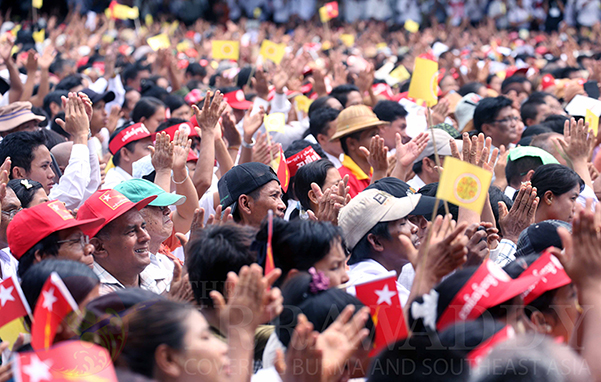 The NLD and 88 Generation Peace and Open Society have been campaigning actively and vociferously for various amendments to the military-drafted 2008 Constitution. Over the weekend, thousands of supporters came out in support of mass rallies for constitutional reform held in Rangoon and Mandalay on Saturday and Sunday, respectively. It is the first time that the two pro-democracy parties have co-hosted an event […]
The NLD and 88 Generation Peace and Open Society have been campaigning actively and vociferously for various amendments to the military-drafted 2008 Constitution. Over the weekend, thousands of supporters came out in support of mass rallies for constitutional reform held in Rangoon and Mandalay on Saturday and Sunday, respectively. It is the first time that the two pro-democracy parties have co-hosted an event […]
Government Leaders Not Ready for Genuine People-centered ASEAN
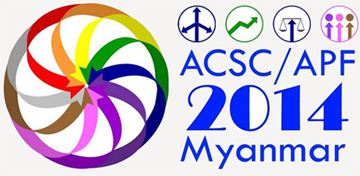 As the leaders of the governments of the Association of Southeast Asian Nations (ASEAN) gathered in Burma for the 2014 summit over the weekend, Cambodian, Malaysian and Singaporean leaders refused to meet with genuine civil society representatives. These three ASEAN member states were poised to substitute the Interface Delegates chosen by civil society groups with their own nominees, which lead the meeting between the ASEAN leaders and civil society representatives to be canceled at the last minute. The ten Interface Delegates were chosen by civil society groups to represent the voices of the 3,000 people who attended the historic ASEAN Civil Society Conference / ASEAN Peoples’ Conference 2014 (ACSC/APF 2014) held in Rangoon, Burma in March […]
As the leaders of the governments of the Association of Southeast Asian Nations (ASEAN) gathered in Burma for the 2014 summit over the weekend, Cambodian, Malaysian and Singaporean leaders refused to meet with genuine civil society representatives. These three ASEAN member states were poised to substitute the Interface Delegates chosen by civil society groups with their own nominees, which lead the meeting between the ASEAN leaders and civil society representatives to be canceled at the last minute. The ten Interface Delegates were chosen by civil society groups to represent the voices of the 3,000 people who attended the historic ASEAN Civil Society Conference / ASEAN Peoples’ Conference 2014 (ACSC/APF 2014) held in Rangoon, Burma in March […]
Experts Urge Transparency in Burma’s Businesses
Most companies operating in Burma and Southeast Asia fail to meet international standards for transparency, according to a survey by the Business and Human Rights Resource Centre (BHRRC).
The London-based organisation, with offices and research fellows in 180 countries, deals with about 5,000 companies with both positive and negative images on human rights. One of its main goals is to obtain responses about misconduct allegations made by civil-society groups […]
• •More Transparency Required Regarding Burma Army’s Operations
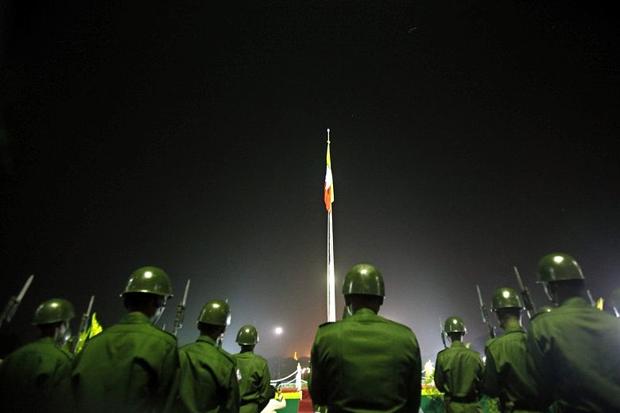 As documented on countless occasions by many local and international groups, the Burma Army has long been committing serious human rights abuses in ethnic areas of Burma, especially recently in Kachin State. Such abuses include waging war against civilians, summary executions, torture and mutilations, rape and other sexual violence against women, men and children, arbitrary detention, destruction of homes and property, and the blocking of humanitarian access. Such abuses terrorise local populations, undermine trust and confidence in the current peace process, and are illegal under international law. Furthermore, many of these human rights abuses could also be classified as war crimes or crimes against humanity […]
As documented on countless occasions by many local and international groups, the Burma Army has long been committing serious human rights abuses in ethnic areas of Burma, especially recently in Kachin State. Such abuses include waging war against civilians, summary executions, torture and mutilations, rape and other sexual violence against women, men and children, arbitrary detention, destruction of homes and property, and the blocking of humanitarian access. Such abuses terrorise local populations, undermine trust and confidence in the current peace process, and are illegal under international law. Furthermore, many of these human rights abuses could also be classified as war crimes or crimes against humanity […]
Poorly Planned Census in Disarray as Calls for Postponement Grow Stronger
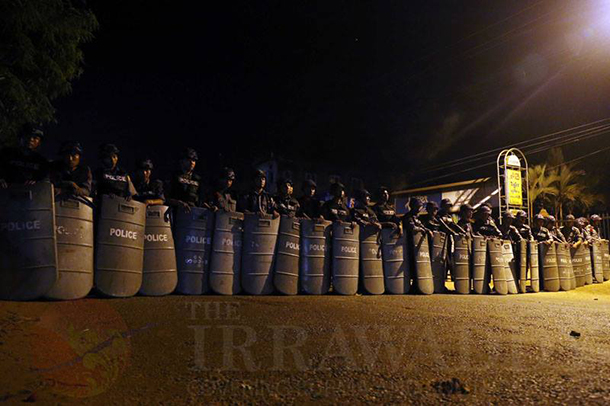 Enumerators arrived in Arakan State on Sunday, 30 March in the company of three hundred armed policemen who were brought into the area in several army trucks to conduct the nationwide survey. The first national census since 1983 should be vital in planning the nation’s needs in health, education and development. However, the census has triggered violence in Arakan State, as humanitarian aid offices were raided, aid workers fled, local aid workers threatened not to assist the Rohingya, and aid to the Rohingya communities living in internally displaced camps has halted.
Enumerators arrived in Arakan State on Sunday, 30 March in the company of three hundred armed policemen who were brought into the area in several army trucks to conduct the nationwide survey. The first national census since 1983 should be vital in planning the nation’s needs in health, education and development. However, the census has triggered violence in Arakan State, as humanitarian aid offices were raided, aid workers fled, local aid workers threatened not to assist the Rohingya, and aid to the Rohingya communities living in internally displaced camps has halted.
So far three people – two under the age of five – have died as a result of the absence of medical care and food prices are soaring as water and food becomes scarce. The Burma government has rescinded their commitment to allow Rohingya’s to self-identify, folding under pressure from Arakanese Buddhists to boycott the census. The tension in Arakan State is spreading throughout Burma as an anti-Muslim riot took place in a town on the outskirts of Rangoon, where an angry Buddhist mob pelted Muslim-owned properties with stones[…]
• • •Facilitating Hate from the Highest Levels of Power
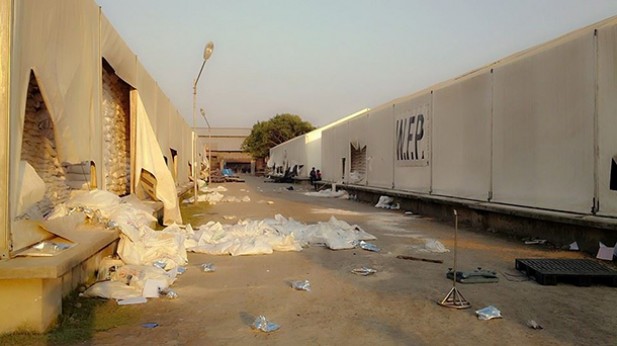 The situation in Arakan State is deteriorating rapidly as extremist monks continue to spread hate speech and incite violence against the Muslim community with impunity. With the upcoming census set to inflame tensions over the issue of Rohingya, Arakanese nationalists have been exacerbating these tensions by campaigning for the census to be changed. Such protests descended into violence as United Nations (UN) and non-governmental organizations’ (NGO) offices were ransacked and aid workers forced to flee. Meanwhile, at the national level, highly discriminatory laws are being drafted by certain ministries to be presented to Parliament.
The situation in Arakan State is deteriorating rapidly as extremist monks continue to spread hate speech and incite violence against the Muslim community with impunity. With the upcoming census set to inflame tensions over the issue of Rohingya, Arakanese nationalists have been exacerbating these tensions by campaigning for the census to be changed. Such protests descended into violence as United Nations (UN) and non-governmental organizations’ (NGO) offices were ransacked and aid workers forced to flee. Meanwhile, at the national level, highly discriminatory laws are being drafted by certain ministries to be presented to Parliament.
The leader of the extremist Buddhist 969 movement, Wirathu, has been whipping up anti-Muslim fervor among the local Arakanese Buddhist population, demanding that the UN-planned census be changed. The All Rakhine Committee for the Census (ARCC) had threatened a state-wide boycott of the census due to the option for Rohingya to identify themselves as Rohingya. Adding to the tension has been the antagonism towards international relief and UN agencies for allegedly favouring Rohingya Muslims in their work. This is, of course, a preposterous claim given that such organizations engage in service provision for those who need it most, regardless of their ethnicity, religion or political affiliation, with the majority of such victims happening to be Rohingya. This fervor came to a head as mobs descended on UN and NGO offices in the state capital, Sittwe, late last week […]
• • •Open Letter from Myanmar/Burma civil society to the Member States of the United Nations Human Rights Council regarding the situation of human rights in Myanmar/Burma
Member States United Nations Human Rights Council Palais des Nations CH-1211 Geneva 10, Switzerland Excellencies, We, a diverse range of civil society organizations from Myanmar/Burma, are writing to you in advance of the upcoming 25th regular session in Geneva to express our serious concerns about the lack of progress made regarding the situation of human […]
• •Briefing Paper on the Situation of Human Rights in Burma/Myanmar 25th Regular Session of the UN Human Rights Council
1.0 Introduction While acknowledging the positive developments that have occurred in some areas relating to human rights in Burma/Myanmar, in other areas, progress has been lacking, while in some others still, significant backsliding has taken place. The areas that have witnessed significant backsliding or lack of progress include: the continued criminalisation and harassment of political […]
• • •








 All posts
All posts